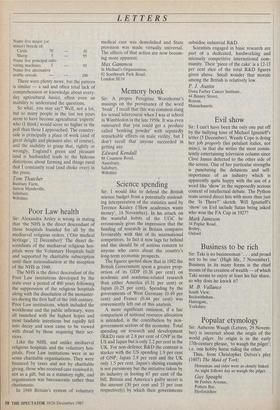Poor Law health
Sir: Alexandra Artley is wrong in stating that 'the NHS is the direct descendant of those hospitals founded for all by the mediaeval religious orders. (`Our medical heritage', 12 December)' The direct de- scendants of the mediaeval religious hos- pitals were the Voluntary Hospitals built and supported by charitable subscription until their nationalisation at the inception of the NHS in 1948.
The NHS is the direct descendant of the Poor Law institutions developed by the state over a period of 400 years following the suppression of the religious hospitals along with the dissolution of the monaster- ies during the first half of the 16th century. Poor Law institutions, which included the workhouse and the public infirmary, were all launched with the highest hopes and most laudable intentions but rapidly fell into decay and soon came to be viewed with dread by those requiring their ser- vices.
Like the NHS, and unlike mediaeval religious hospitals and the voluntary hos- pitals, Poor Law institutions were in no sense charitable organisations. They were financed by taxes and not by charitable giving, those who received care received it, not as a gift, but as a statutory right, and organisation was bureaucratic rather than charismatic.
In 1948 Britain's system of voluntary medical care was demolished and State provision was made virtually universal. The effects of that action are now becom- ing more apparent.
Max Gammon
St Michael's Organization, 92 Southwark Park Road, London SE16










































































































 Previous page
Previous page